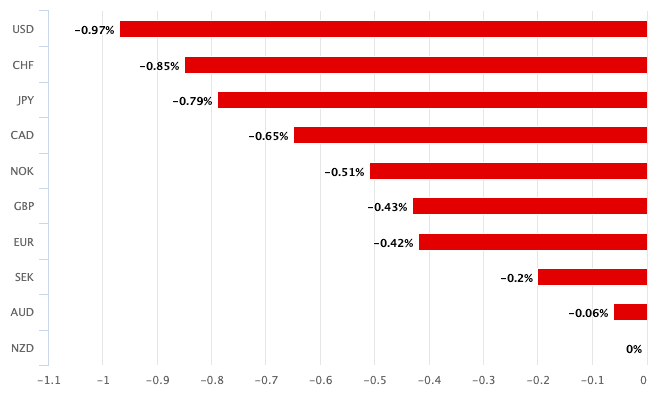The New Zealand Dollar is the big loser as Iran and Isreal attack each other.
The Kiwi is softer against all its G10 rivals following news that Israel’s air force launched a major attack on Iran early on Friday morning, and Iran has launched around 100 drones against Israel in response.
The head of Iran’s Islamic Revolutionary Guard Corps, was killed in the Israeli attack, according to Iranian state news.
"Markets reacted sharply, with oil prices spiking, U.S. stock futures falling, and safe-haven assets like gold rallying. The US Dollar Index was trading higher. Equities were under pressure," says Shane Strowmatt, an analyst at LGT Private Banking.
Of the world's major currencies, the New Zealand Dollar is perhaps one of the most sensitive to negative flare-ups in global geopolitical tensions, tending to track stock markets lower.
A major selloff in Asian stocks and then the promise of similar action in European and U.S. markets therefore sets it up for a soft finish to the week.
In fact, the Kiwi is down against all its major peers:

Above: NZD performance against the G10 on June 13.
The Pound to New Zealand Dollar trades 0.34% higher on the day at 2.2507, the Euro to New Zealand Dollar is higher by half a per cent at 1.9176. Against the U.S. Dollar, the Kiwi is 0.85% lower on the day at 0.6017.
With markets likely watching for Iranian retaliation over the weekend, the new week could see some follow-through action and mounting losses for the NZD.
Although recent episodes of Israel-Iran tensions were quick to fade, there is no denying this time we are looking at a clear escalation.
We think U.S. President Trump will work hard to de-escalate tensions, as was the case when India and Pakistan attacked each other earlier this year.
If so, we would expect diplomacy to ratchet up and the hope is Iran will concede to U.S. offers for mediation.
If this is the case, then the big losers from today will be the big winners when the turnaround comes.
For now, however, catching falling knives is an unwise strategy.
